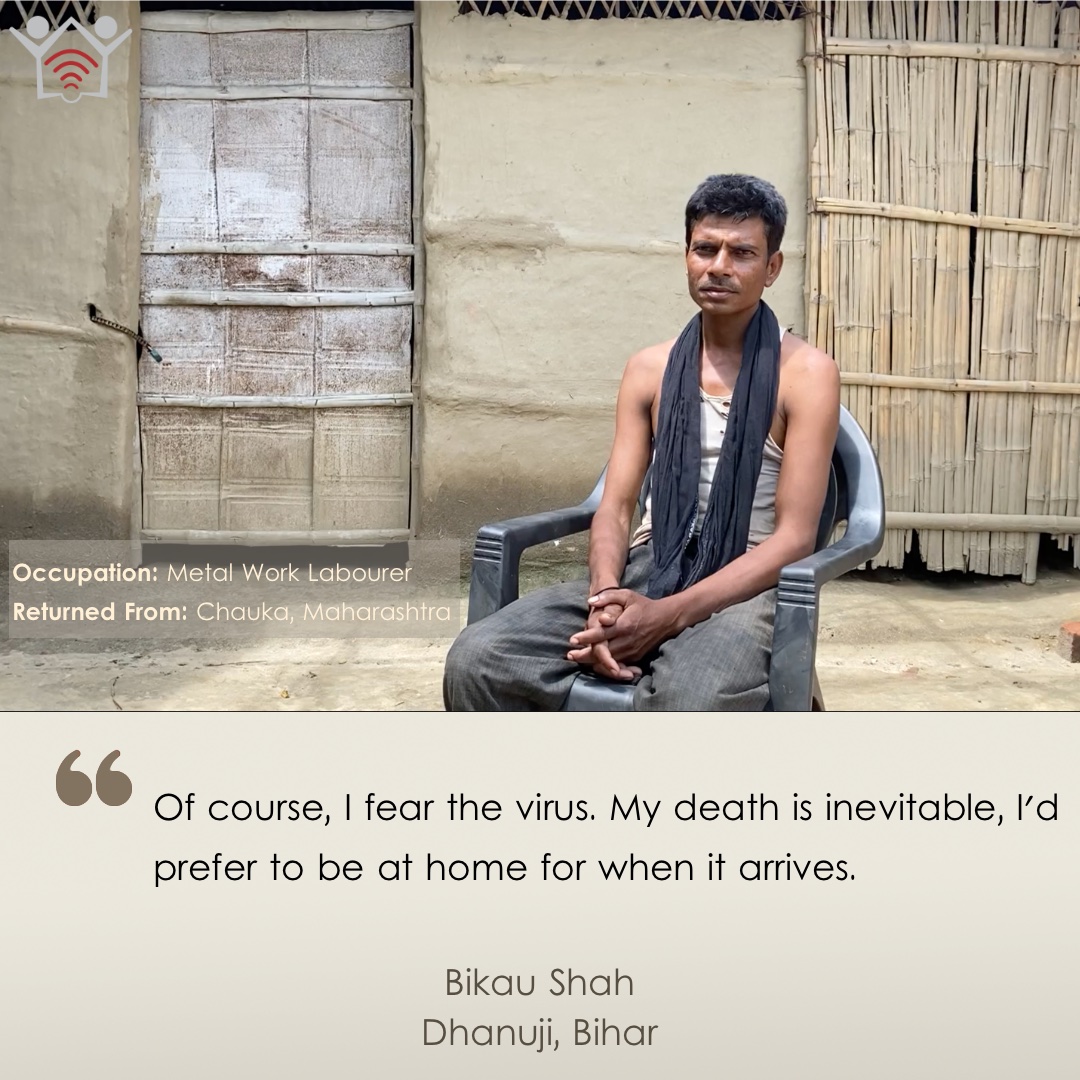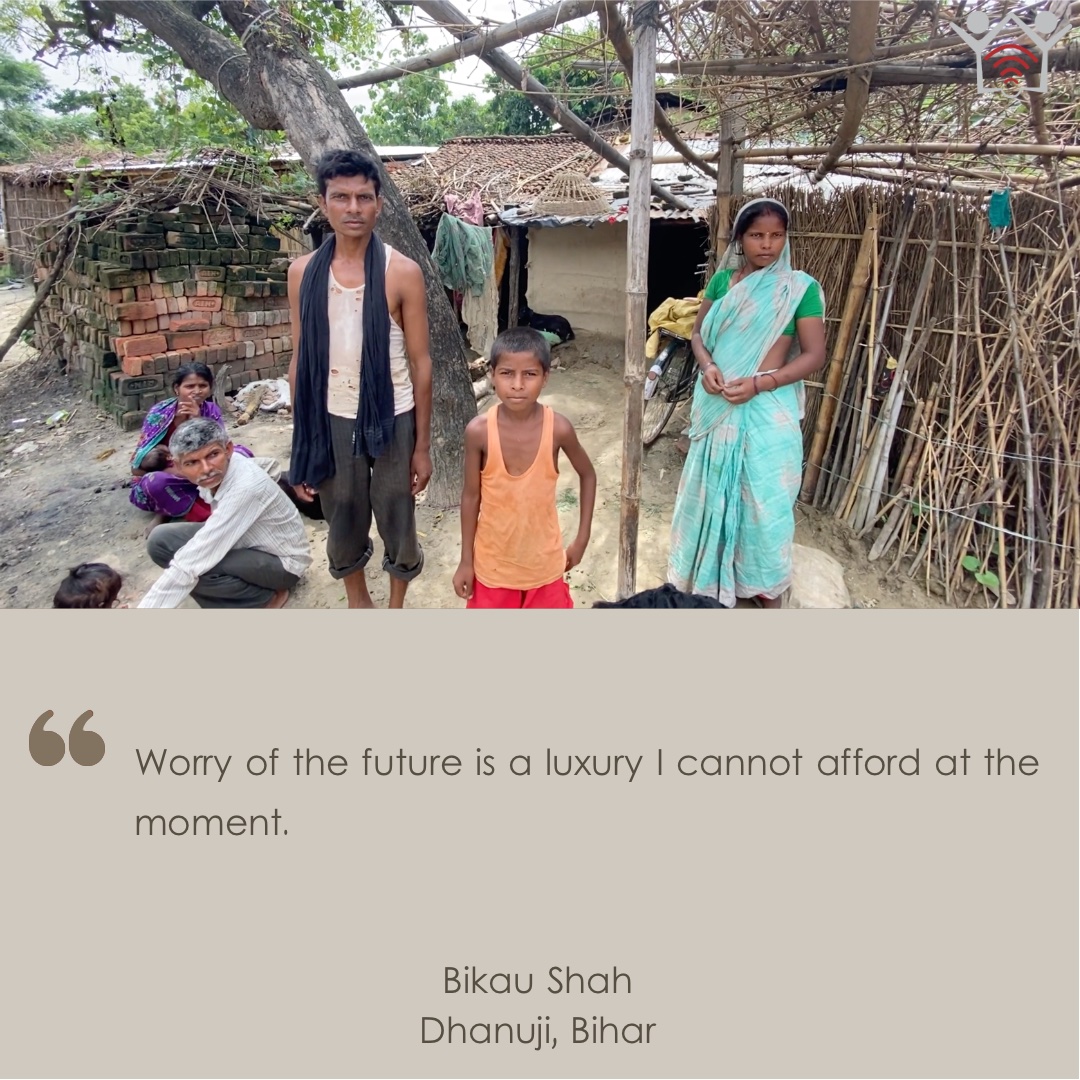Name: Bikau Shah
Hometown: Dhanuji, Bihar
Occupation: Metal work
Returned From: Chauka, Maharashtra
Bikau Shah is a laborer at a steel plant in Chauka, Maharashtra. In 2010, he migrated with a contractor for feasible manual work. The earning sent back home would range depending on the requirement of the family for the month. In March, Bikau heard about the lockdown through updates on his smartphone. He and other workers waited a month to understand the restrain of the situation. It was finally the fear that broke them, and they chose to walk back home. Bikau’s fear of the virus further expanded during his journey back to Dhanuji, Bihar.

Interviewer: What was your initial reaction to the Covid-19 virus?
Bikau Shah: In the first few weeks — they reported 200 – 2000 cases a day in my neighbourhood. The company shut on 22nd March. During my month in Maharashtra, the ration stores provided me with oil, pulses, fruits, and other essential commodities. It was not a hassle. My flatmates and I discussed possible modes of transport back to Bihar. Since there were none accessible at the time, we began by walking. Not right away though, we were first tested at the local government testing facilities. We set afoot at sundown, covering 60 k.m. The locals were comfortable enough to provide us with food and we rested on the footpath for the night. One of the policemen inquired about our current state and journey; he requested one of the truck-driver for a complimentary ride to shorten our walk. While at first there were no struggles, it was after covering a certain distance the truck-driver demanded to be compensated or else he would drop us off. By compiling what was left of our savings, we paid the driver Rs. 1,500. We were dropped 60 k.m. from Uttar Pradesh. The next ten days were excruciating due to the heat and lack of help by commercial vehicles.
Before leaving from Chauka, I used the internet to learn the quarantine procedure and other necessary precautions to be taken. Upon reaching Dhanuji, Bihar — I quarantined for fourteen days at the local school. The essential products: soap, water, clothes, etc. were given along with all three meals. It was not as crowded either, there were eleven individuals in one room and two hundred in the building. The doctors would conduct routine inspections too.

Interviewer: How was your life in Bihar before and after the lockdown? Did you inquire about government schemes?
Bikau Shah: I left Bihar sixteen years ago to look for my first job. I was twenty-three, had no education, and no work experience either. The conditions in Bihar did not allow me and other workers with sufficiently waged employment. At first, I would make Rs. 50 in a day and today in Maharashtra, I can earn ranging Rs. 10,000 – Rs. 20,000. When the unforeseen expenses arise, I work night shifts. The contractor would charge a 20% commission, though housing was always provided. My expenses would be food and some other essentials costing Rs. 4,000. My only reason to earn the fixed number is to provide my children with the education I was not given. To put them through this distress is avoidable. It costs Rs. 250 for one child in a private school. I have three daughters and a boy; the three siblings study in a private school and the third daughter is too young.
After the two-week quarantine, I was content being with my family. Now, I often rely on ration and labor work, bringing in Rs. 200 a day as opposed to Rs. 500 working at the steel plant. There are no viable sources of income here. In case the work resumes, I still would not choose to go back. I can pay for my children, and I must aid them with education; they will fend for themselves. The virus still frightens us. I know I will die, it could be anywhere. I’d prefer to be at home for it.
I am hoping the government could generate more job opportunities in Bihar to ease our struggle. I did not dig too deep, our days are spent at home or work. Being scared is a luxury we cannot afford in this crisis.






